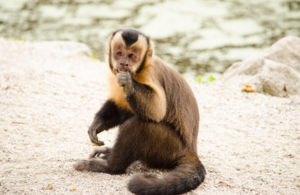Government delivers on promise to ban keeping of primates
New legislation on primates as pets introduced today.

- Under changes, only private keepers who can provide the highest welfare standards will be able to keep primates
- Legislation fulfils a manifesto commitment and Action Plan for Animal Welfare pledge
- Move will improve the welfare of up to 5,000 primates kept as pets in the UK
Keeping primates as pets will be banned under new legislation introduced by the Government today (14 December), improving the welfare of thousands of animals.
The legislation brings in a licensing scheme setting strict rules to ensure that only private keepers who can provide the highest welfare standards will be able to keep primates.
It is estimated that up to 5,000 primates are kept as pets in the UK. These wild animals have complex welfare and social needs and, according to most experts, cannot be properly cared for in a domestic setting.
Under the changes, introduced via secondary legislation under the Animal Welfare Act 2006, it will no longer be possible to keep primates in domestic settings as household pets in environments that fail to provide for their needs.
Licensing is expected to come into force in 2026, subject to parliamentary processes, with existing keepers having two years from the SI being approved to reach compliance with the licensing conditions.
The new laws deliver on a manifesto commitment and builds on the recent primate consultation. It is already an offence to keep a primate while not providing for their welfare needs, or to cause them unnecessary suffering. Today’s announcement tightens these rules further – and all private primate keepers will be required to hold a licence, issued by their local authority. Failure to comply with the law could result in an unlimited fine or removal of the primate.
Primates are highly intelligent and require open spaces, varied diets, social contact and stimulation.
Animal Welfare Minister Douglas-Miller said:
“Primates are intelligent and curious animals and we’re delivering on our pledge to ban the keeping of these inquisitive creatures as pets.
“It is already an offence under the Animal Welfare Act to keep a primate while not providing for their welfare needs or to cause them unnecessary suffering, and these plans will tighten the rules further.
“We have consistently led the world in raising the bar for animal welfare standards and this legislation is yet another step.”
Licences will be valid for a maximum of three years, with at least one inspection per licensing period. Licence holders must undergo re-assessment to renew their permission to keep these animals.
Guidance will be provided to local authorities on how to measure the new standards at inspection to ensure the highest level of welfare is being maintained.
Dr Ros Clubb, head of the RSPCA’s Wildlife Department said:
“We warmly welcome this UK Government commitment to end the keeping of primates as pets.
“The RSPCA has been calling for a complete ban on the keeping and trade of primates as pets for many years as these animals are intelligent, sentient and highly social - with complex needs that simply cannot be met in a domestic environment.
“Our inspectors and rescuers regularly see primates that have been kept as pets with behaviour problems and very poor health, especially Metabolic Bone Disease (rickets in humans), as a result of totally inappropriate care. We hope this will put an end to the shocking situations we have seen - with monkeys cooped up in bird cages, fed fast food, sugary drinks or even Class A drugs, deprived of companions of their own kind, living in dirt and squalor and suffering from disease.
“We look forward to working with the UK Government to ensure that the proposed licensing system can be adequately enforced, and will be robust enough to effectively protect the welfare of primates that remain with private keepers until the end of their natural lives.”
The UK was the first country in the world to introduce animal cruelty offences and are the highest ranked G7 nation according to World Animal Protection’s Index. Our flagship Action Plan for Animal Welfare committed us to going even further to protect animals, including banning primates as pets and banning the export of live animals .
The Animal Welfare (Livestock Exports) Bill – which is only possible now we have left the European Union – which was introduced in Parliament last week and will put an end to the export of live animals for slaughter and fattening from Great Britain, stopping animals enduring unnecessary stress, exhaustion and injury on long journeys.
Since publishing the Action Plan for Animal Welfare in 2021, we have brought in new laws to recognise animals sentience introduced tougher penalties for animal cruelty offences; extended the ivory ban to cover other ivory bearing species; and supported legislation to ban glue traps, the import of detached shark fins and measures to ban the advertising and offering for sale of low welfare activities abroad.
Notes to editors
- This announcement follows a consultation earlier this year on the introduction of the licensing regime as well as the primate-keeping welfare standards. A summary of responses to that consultation has been published today